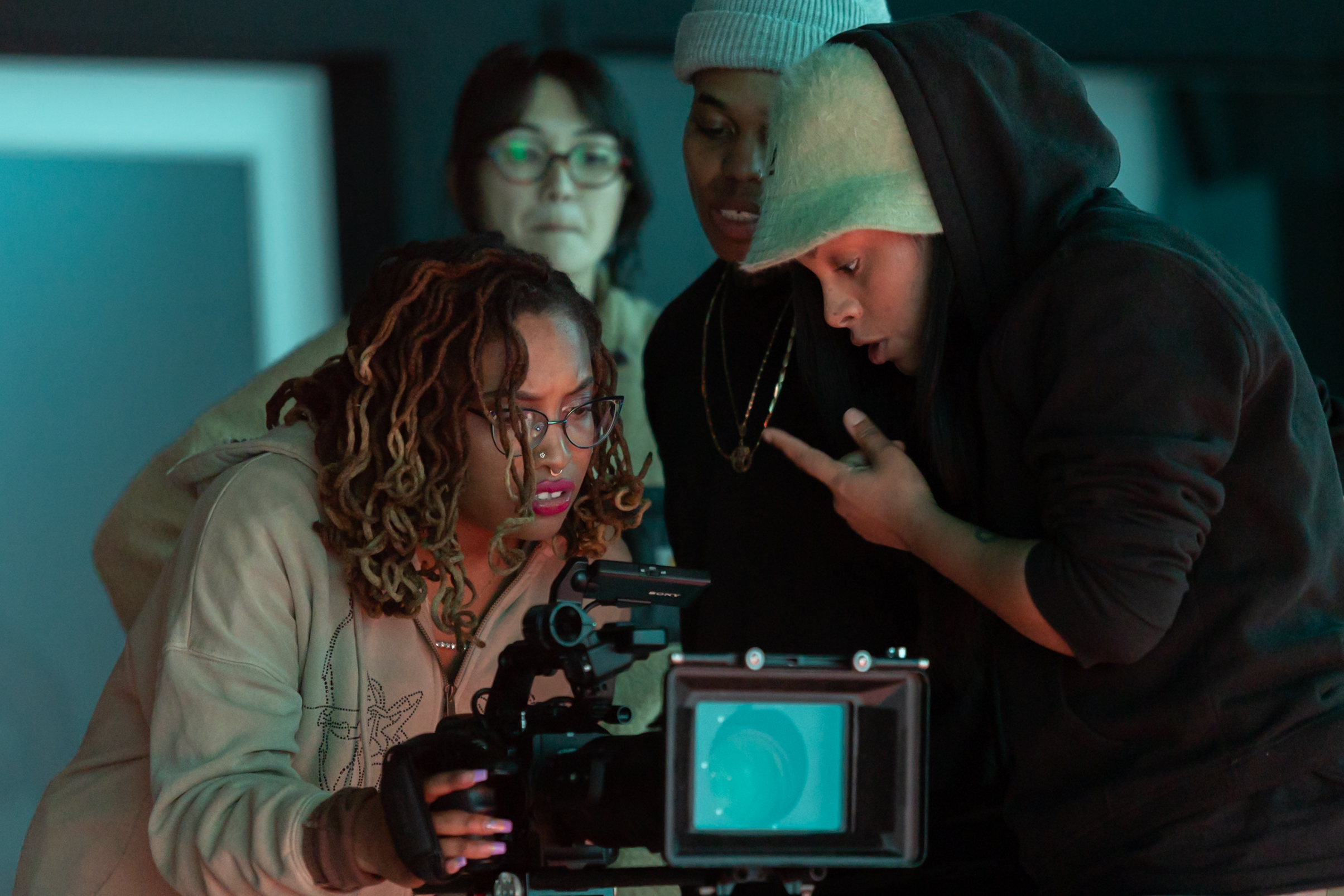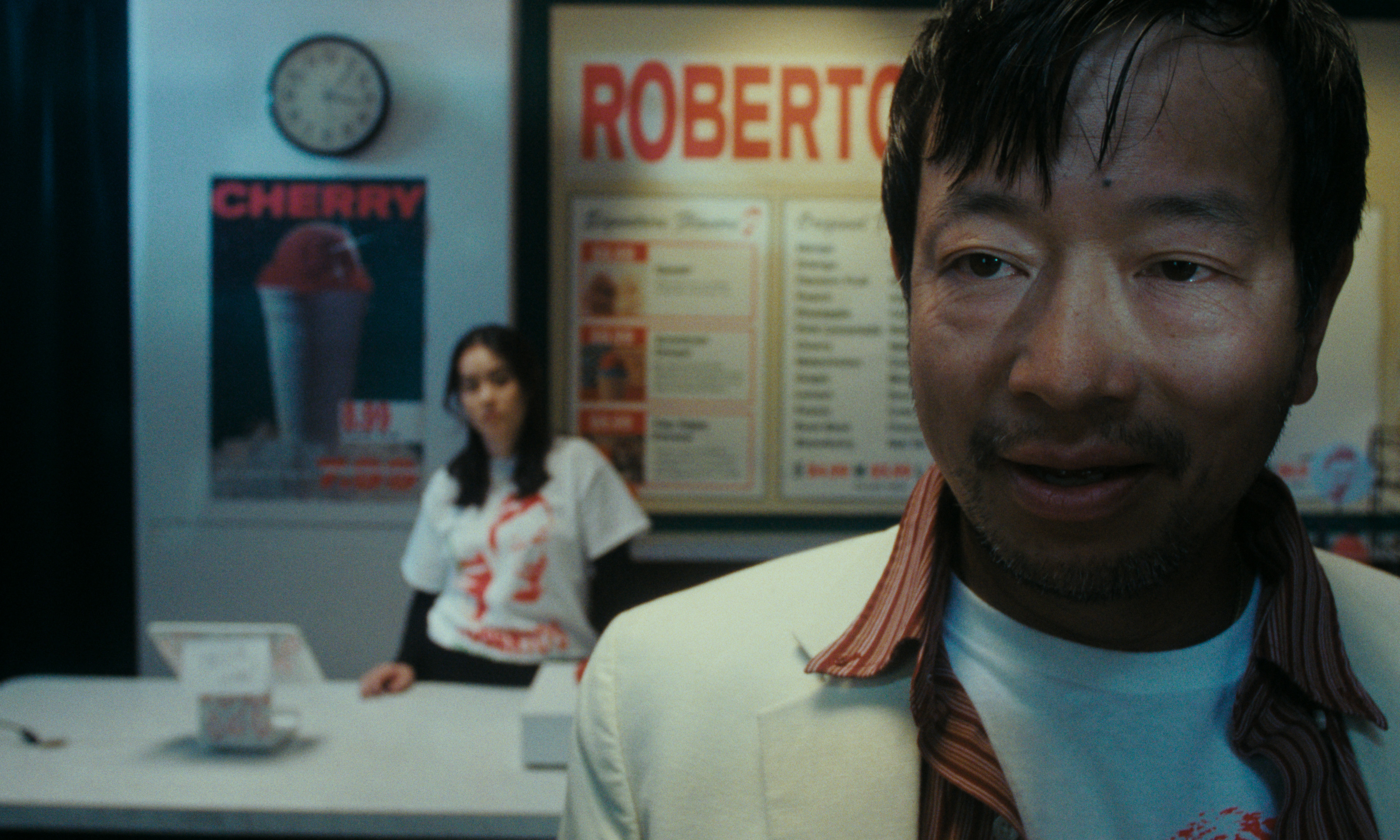The cinéSPEAK Journal publishes a monthly Philadelphia Artist Spotlight highlighting local filmmakers and moving image artists doing unique and impactful work.
Film transforms how we see space and time. For Baltimore native and Trinidadian filmmaker Kayla Naomi Watkins, documentary filmmaking is a space of possibility and transformation. Since moving to Philadelphia over ten years ago, Watkins has been centering stories illuminating how systemic and social oppression impact Philadelphia residents’ livelihood, mobility, and safety. Rooted in community and youth media, she has created video work for organizations like Scribe Video Center, Educators for Consent Culture, and The University Community Collaborative. In 2022, Watkins received the Leeway Foundation Art and Change Grant to collaborate with Educators for Consent Culture to create a video series documenting consent education in Philadelphia, featuring stories from survivors, educators, counselors, and parents. She currently works as a producer at WHYY, where she celebrates Philadelphia’s rich history, culture, and current issues in short-form documentaries.
Watkins’s upcoming documentary project Bumpa is a short film that explores how Black women and femmes reclaim or discover their autonomy and sexuality through twerking and whining on the dance floor. Given the long history of the hypersexualization or desexualization of Black women in the US and Caribbean, Watkins creates the documentary as a safe space where every dancer’s body is honored, liberated, and celebrated. In doing so, she immerses viewers into a world where Black women and femmes reign supreme.
The cinéSPEAK Journal spoke with Kayla about her latest film and themes of Black dance culture, Black women’s bodily autonomy, and consent throughout her work.

cinéSPEAK: Can you share information about your latest film project?
Kayla Watkins: In December, I completed production for a personal film, Bumpa, a Black femme dance film. We document the Afro-Caribbean dance, whining, and Black American dance styles of twerking to analyze respectability politics, pressures to accommodate whiteness, and criticism of sexual expression imposed on Black people. To contextualize the importance of these dance forms, I will intercut archival footage and expert opinions from Black and Caribbean street, hip-hop, and burlesque dancers. These interviews will be framed with some interview subjects freestyling a group dance, exploring movements ingrained in our culture for millennia. This film will generate conversations about the defiance, exaltation of autonomy, and honoring ancestral traditions of group movement inherent in these spaces and dance forms.
cinéSPEAK: What inspired you to be a filmmaker?
KW: I got into an arts high school in Baltimore; it was the only way to avoid a school with a metal detector. I was always drawing and picked up oil painting, but I didn’t know any Black people with a career in painting. [However,] I had heard of Black filmmakers. My film teacher told me how his film career gave him the opportunity to travel to China to film every summer, and I wanted that to be my life. My first documentary, at [age] 14, was about racist jokes. I heard white Baltimoreans speak so casually about race, and I wanted to document these irreverent attitudes alongside the Black and brown Baltimoreans who had to hear these micro-aggressions. I screened the film at my high school film festival, and after hearing the full-blown arguments about the piece from the audience, I was hooked on filmmaking.
I was so used to seeing stories in the media that I did NOT relate to. As a kid from an impoverished family in West Baltimore, constantly moving and surviving intra-community and systemic violence, I didn’t relate to most media. I didn’t see the perspective of working women, of first-generation Black Americans who were fully comfortable within their Blackness. I wanted to labor as an artist, and filmmaking felt the most freeing, had the most potential for travel, and offered regular chances for community engagement.

cinéSPEAK: What topics and themes are you exploring in your work?
KW: Autonomous visual representation is one of the key elements of achieving liberation in a world that revolves around media consumption. In my work, I am visualizing the feeling of being watched, consumed, and repackaged as a Black femme human for others to evaluate without consideration of our inner motivations.
My work seeks to go beyond the “tolerance” of my humanity into true intra- and inter-communal solidarity. I am filming a world which denies the self-determination of people through the use of propaganda and I seek to create alternative, accessible, community-centered counter-propaganda. The histories of Black and brown people are oral, visual, kinetic, veiled, and endangered–and I have chosen filmmaking, painting, and media education as my way to interrupt our erasure.
cinéSPEAK: How has Philadelphia shaped and influenced your work?
KW: I was born and raised in Baltimore, and I became an adult in Philly. I needed to live in a city that was Black, like Baltimore, but had more artistic opportunities and a functional public transportation system. I needed a city with my mother’s Trini food but where I could still afford a nice place to live. Philly has afforded me stability that I never got in Baltimore. I’ve been able to make a career as a filmmaker for ten years here without a car and without much money. Philly helped me understand Baltimore and all cities with a very large Black impoverished population better than I would have had I stayed in one place. Philadelphia solidified my belief in the need for Pan-African unity and all of my work now is centered around Philly people, art, and organizations.
I have been organizing since I arrived in Philly, and leftist organizers have sharpened my analysis of white supremacist capitalism that I began to form in Baltimore. My consent work stems from consent organizing I have done here in Philly and my films feature Philly dancers and artists. I would say that organizers and their work educating Philadelphians on our material conditions has impacted my work the most.

cinéSPEAK: What impact do you want your work to have in the Philadelphia community?
KW: I have worked with youth in filmmaking since I arrived here, and I have felt most fulfilled when youth tell me that my work, my classes, or even a conversation gave them the confidence to pursue filmmaking. I want to create work that helps younger people learn how to navigate the world, to let them know they are not insane to want a life that isn’t so segregated and miserable. I want my work to encourage people to get active with local organizations and explore their own cultures. I want people to be able to walk away from my work feeling more connected to community, more willing to fight for a better future.
cinéSPEAK: Is there anything else you’d like us to know about your work?
KW: I am working very hard, and I am grateful for all the blessings I’ve received in this art-loving city. I want to thank Nuala Cabral and Khalid Ali for introducing me to production.
If you would like to keep up with Kayla Watkin’s work, you can check out her website or follow her on Instagram @knwfilms. You can also watch her latest work at WHYY Now here.
*Featured Image: Image of Kayla Watkins and other crew members behind the scenes. Image credit: Kessai Watkins.
Would you like to be featured in a future spotlight? Please fill out the Philadelphia Artist Spotlight form. The cinéSPEAK Journal maintains sole discretion over the publishing of any information provided via the form. Questions: journal@cinespeak.org
Ireashia M. Bennett (they/them) is a Philadelphia-based filmmaker, photographer, and writer whose work aims to celebrate Black queer and disabled folks in the form of new media, short films, and photoessays. They earned a B.A. in Journalism from Columbia College Chicago and are pursuing an MFA in Film and Media




